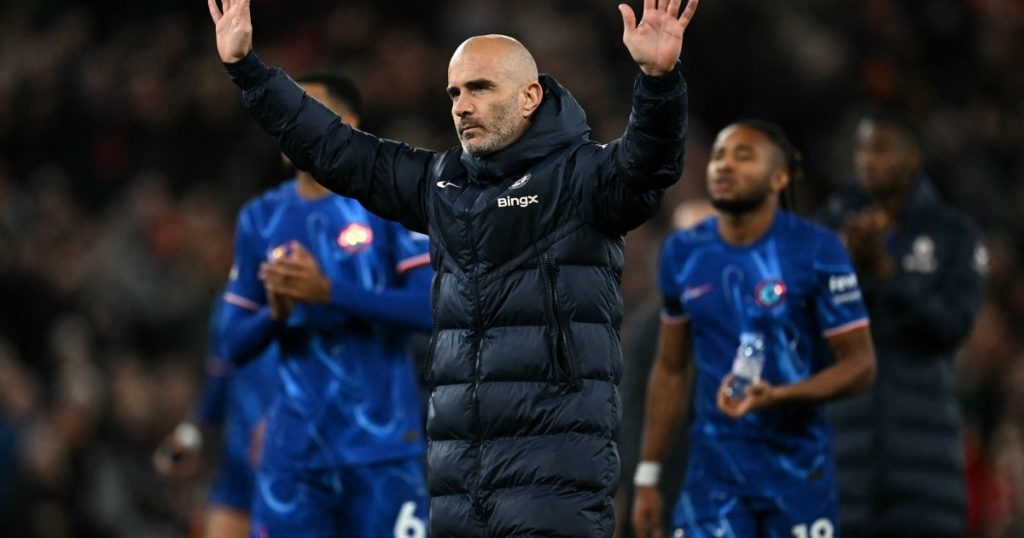Chelsea’s turbulent season continued with a frustrating 2-2 draw against a struggling Ipswich side at Stamford Bridge, a result that leaves their Champions League qualification hopes hanging in the balance. The draw, met with boos from the home crowd, further exposed the growing tension between new manager Enzo Maresca and the Chelsea faithful, particularly regarding his tactical approach. Despite dominating the early stages, Chelsea found themselves two goals down against the run of play, prompting a volatile reaction from the supporters. The second goal, stemming from goalkeeper Robert Sanchez’s decision to play a long ball instead of adhering to Maresca’s preferred short-passing build-up strategy, became a focal point of contention. While Chelsea managed a late comeback through an own goal and a Jadon Sancho strike, the dropped points left them sixth in the table, trailing fifth-placed Manchester City by a single point with only six games remaining.
Maresca’s insistence on playing out from the back, a cornerstone of his philosophy, has been a source of both admiration and frustration amongst Chelsea fans. While it can lead to attractive, controlled football, it also carries inherent risks, especially when facing a determined opponent. The second goal against Ipswich highlighted this vulnerability, with Sanchez seemingly pressured by the hostile atmosphere into abandoning the short-passing approach, a decision that ultimately backfired. Maresca, while acknowledging the fans’ frustration, defended his tactics, suggesting that the long ball played by Sanchez was a direct result of the negative environment created by the crowd’s reaction to going behind. This incident further underscores the delicate balance between sticking to one’s principles and adapting to the pressures of a demanding fanbase.
The atmosphere at Stamford Bridge has become increasingly fraught as the season has progressed, with Maresca’s methods often coming under scrutiny. The boos that rained down on the team at half-time reflected the fans’ growing impatience with the inconsistent performances and the perceived rigidity of the manager’s tactics. While Maresca has previously stated his willingness to substitute players who don’t adhere to his build-up play instructions, the incident with Sanchez suggests a more complex dynamic at play. The goalkeeper’s decision to play long seemingly stemmed from a desire to alleviate the pressure from the crowd, highlighting the potential for external factors to influence on-field decisions, even against the manager’s wishes.
The Chelsea manager, while stopping short of explicitly pleading for the fans’ support, acknowledged the importance of a positive atmosphere for the team’s success. He recognized the fans’ right to express their frustrations, particularly when the team is underperforming, but subtly hinted at the detrimental impact their negativity can have on the players’ confidence and decision-making. The incident with Sanchez serves as a case in point, with the goalkeeper’s deviation from the game plan potentially influenced by the hostile reaction from the stands. Maresca’s comments suggest a plea for understanding and patience as he attempts to implement his vision for the club, while also acknowledging the need for results to appease the demanding Chelsea faithful.
Despite the setbacks and the growing discontent, Chelsea’s season is not yet lost. They still have a fighting chance of securing Champions League qualification through a top-five finish, although the margin for error is slim. Furthermore, they hold a commanding 3-0 lead after the first leg of their UEFA Conference League quarter-final against Legia Warsaw, providing a potential alternative route into next season’s Champions League. This two-pronged approach offers a glimmer of hope for Chelsea, but it remains to be seen whether Maresca can navigate the mounting pressure and galvanize his team for the crucial final stretch of the season.
The remainder of Chelsea’s campaign promises to be a tense affair, with the team’s performances under intense scrutiny. Maresca’s relationship with the fans remains a delicate balancing act, with the manager needing to deliver positive results to win over the doubters. The draw against Ipswich served as a microcosm of the ongoing tensions, highlighting the challenges of implementing a new playing style amidst the expectations of a demanding fanbase. The coming weeks will be crucial in determining not only Chelsea’s fate this season, but also the long-term viability of Maresca’s project at Stamford Bridge.














